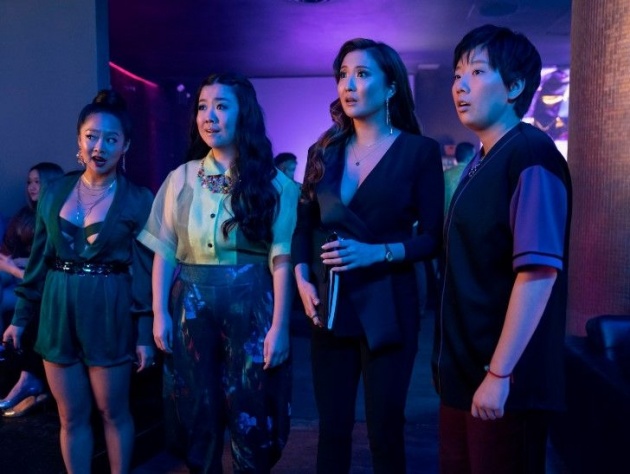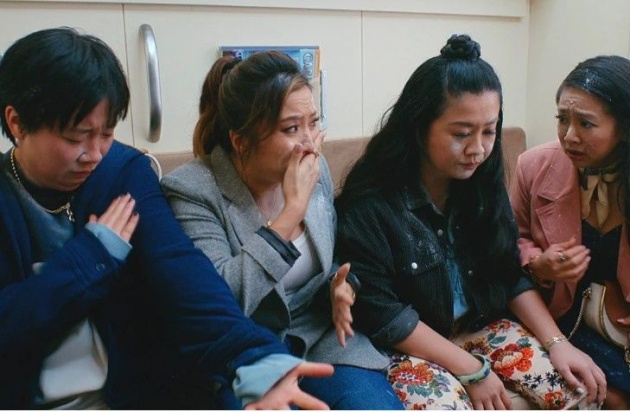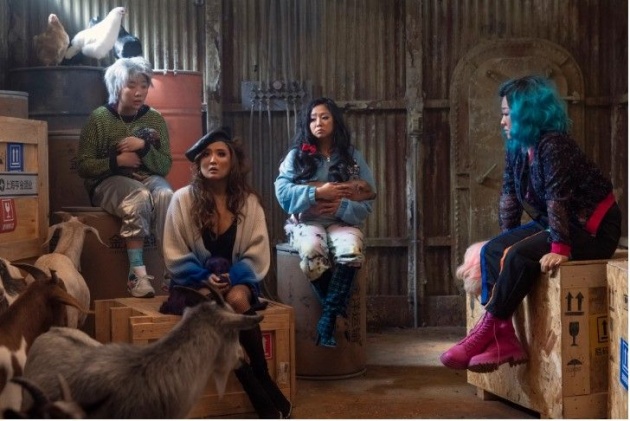
Pictured: Party time. From left to right: Kat (Stephanie Hsu), Lolo (Sherry Cola), Audrey (Ashley Park) and Deadeye (Sabrina Wu) in a scene from the Asian-American female comedy, 'Joy Ride', directed by Adele Lim. Still courtesy of Lionsgate (UK / US). Photo: Ed Araquel.
The final film of this series is a foul-mouthed feelgood comedy about female friendship entitled Joy Ride, co-written by Cherry Chevapravatdumrong and Teresa Hsiao and directed by Adele Lim. The first film in this series (volume seven) was also called Joyride, but it is hard to imagine Olivia Colman doing half the stuff that the American Asian cast of Lim’s film act out – or maybe I just don’t want to. Joy Ride goes squarely for the crude belly laugh – nothing wrong with that, it is a form of exercise. At the US box office, it opened against Insidious – The Red Door, a franchise title with nothing new to offer but nonetheless scored an impressive $15 million in its first day of release (7 July 2023). I guess the guys taking dates to their movies are as controlling as an American comedian turned director who wouldn’t let his surfer teacher partner post pictures of herself on social media in a swimsuit. If you were shown The Red Door, maybe you should form an online support group.
Joy Ride begins with a Chinese immigrant family – mother, father, young daughter - arriving in the suburb of White Falls in 1998 who remark how white everyone is. A white American couple (David Denman, Annie Mumolo) sidle up to them and ask if their daughter can play with young Lolo (Belle Zhang). ‘Why would they do that?’ asks Lolo’s father (Kenneth Liu). But their adopted daughter Audrey (Lennon Yee) is also Chinese. Audrey takes Lolo to the playground, where their path to the swings is blocked by a racist kid. The forthright Lolo puts him in his place.
From then on, Lolo and Audrey become fast friends – chowder buddies for life – as they carve very different paths. Audrey trains to become a lawyer while the wayward Lolo becomes an artist, creating suggestive decorative items like the ‘licky cat’, a model that moves its tongue and its arm, as well as a reproduction of the playground where Lolo and Audrey bonded. Chevapravatdumrong cut her writing teeth on Family Guy and the quick-fire crude joke quotient will be familiar to fans of Seth MacFarlane’s animated show – there’s even a chicken put out of its misery. Having beaten her boss at racquetball – in the UK we call it squash, but neither acknowledges the wall against which the ball is hit – adult Audrey (Ashley Park) is sent to Beijing to negotiate a deal. What sort of deal? Don’t ask. She agrees to take Lolo (Sherry Cola) as her translator, even though Lolo doesn’t know much Mandarin. Lolo invites her insular K-Pop obsessed androgynous cousin Vanessa, also known as Deadeye (Sabrina Wu) to tag along. Audrey also arranges to meet her former colleague roommate, Kat (Stephanie Hsu) who is now a star on Chinese television in the series, ‘The Emperor’s Daughter’. Men fight over her. Blood results. All four find themselves on a road trip to locate Audrey’s birth mother, whom Audrey must convince to join her at the seventieth birthday party of the mother of a potential client or business partner or somebody.
The plot is an excuse for comedic set pieces involving drugs, family, and professional athletes. The trailer highlights the best gags. The joy of the film is the interaction between the four women, each a well-defined social type. Audrey sees herself as ambitious and will do what it takes to get the deal done, matching the men she parties with drink for drink. At one point, she downs a concoction entitled a thousand-year-old egg, which leads to facial reddening and vomit, naturally over the potential client’s shirt. No problem, he’ll remove it. While taken with her, he is unimpressed that she hasn’t met her father. Business is based on personal connection. ‘How can I know you if I don’t know your family?’ he asks. Fortunately, Lolo has been in touch with the adoption agency and asserts she has spoken to Audrey’s mother.
Lolo herself is desperate not to become her parents, who run a successful restaurant but are limited in their ambition. She is wayward and assertive, not interested in becoming a stereotypical doting daughter. Having moved in with Audrey, she doesn’t know that her best friend thinks of her as a leech. If Audrey seals the deal, she’ll be promoted to associate and move to the Los Angeles office, leaving her best friend behind. ‘You’ll love it there,’ a white male colleague tells her. ‘There’s Chinatown, Koreatown, Little Tokyo.’ Rolling her eyes at her colleague’s stereotyping, Audrey doesn’t tell Lolo about the planned move.
Lolo’s cousin Deadeye is an emo who lives most of her life online, conversing with individuals who have numbers at the end of their names, like the droids from Star Wars. She is desperate for human contact and clings to Audrey and Lolo, much to Audrey’s chagrin. She is seen as a party pooper. ‘Hey, there is a guy in a BTS t-shirt,’ she says at one point. ‘Why don’t you talk to him?’ Deadeye has her grace moment, when her online friend pulls through, pretending to be the manager of a fictitious K-Pop band called ‘Brownie Tuesday’, Audrey, Lolo, Kat and Deadeye pretending to be members of the band to fool an airport official to allow them to travel without passports. They perform a song that turns into a viral video when Kat exposes herself.
Kat’s tattoo offers the film’s biggest belly laugh. She describes herself as Audrey’s best friend – at college at least, upsetting Lolo. The two women were members of an acapella group, though Kat was better known for – ahem – her sexual exploits. It is humorous to Audrey that Kat won’t sleep with her co-star boyfriend until their wedding night, though she has a particular reason. Kat knows a basketball player (Baron Davis, playing himself) who arrives with his team to give the young women a lift. This leads to a comical sex scene that is simultaneously explicit yet not – no female nudity – and ends with two men’s heads between one woman’s legs.

Pictured: Girl powder. The quartet (Sabrina Wu, Ashley Park, Sherry Cola and Stephanie Hsu) receive an unexpected shower aboard a train in the Asian-American comedy, 'Joy Ride', written by Cherry Chevapravatdumrong and Teresa Hsiao and directed by Adele Lim. Still courtesy of Lionsgate (UK / US). Photo: Ed Araquel.
On arrival in China, Audrey reflects on no longer looking out of place. ‘But you are,’ Lolo tells her. ‘American Chinese are different from other Chinese.’ She categorises the people around them; ‘Hong Kong Chinese’, always on the phone, and so on. Lim and her screenwriters are keen not to push Asian stereotypes too far. Actually, we get very little sense of what China is like, other than offering a bustling metropolis with a taste for hedonism. The filmmakers are happy to offend middle American sensibilities, but China gets off lightly. In the film, it is China that is exploited by westerners, evidenced by the American drug dealer (Meredith Hagner) who makes the women take her drugs to avoid arrest and then steals their suitcase. The joke is that a white American woman is a lot less sinister than some of the Chinese occupying other cabins. The friends discover what kind of lone American woman would settle in China – a criminal. China also offers an opportunity for Baron Davis to continue playing basketball after leaving the US. It is clear that a trade-off has been made.
In the finale, Audrey makes an important discovery about her mother, in a scene that balances comedy and sentimentality. There is a cameo from an Asian star associated with a successful television series, who is on hand to offer Audrey some comfort. Restaurant scenes can offer high comedy; in Joy Ride, it is more ‘hugs – party of three’. The film is a lot less edgy than first appears, though a cover of a raunchy song depends in part on your knowledge of the original.
This is also a female comedy in which men aren’t part of the problem. There is no patriarchy holding the women back, rather white Americans. ‘I’m still an ally,’ says one guy after giving Audrey some bad news, as if desperate to maintain his political correctness.
Some of the gags have the looseness of improvision, such as Audrey demonstrating that a mouth can seem wider whilst showing teeth than hiding them. Lim allows each of her cast members to shine, Sabrina Wu (as Deadeye) demonstrating a flair for cold-eyed physical comedy, whether beatboxing or silencing a chicken.

Pictured: Not every goat is the Greatest Of All Time. Four friends (Sabrina Wu, Ashley Park, Stephanie Hsu and Sherry Cola) travel cattle (and goat) class in a scene from the Asian-American comedy, 'Joy Ride', co-written by Cherry Chevapravatdumrong and Teresa Hsiao and directed by Adele Lim. Still courtesy of Lionsgate (UK / US). Photo: Ed Araquel.
Some gags veer towards the stereotypical, for example the Chinese grandmother who speaks with a comedy accent. The attempt to ingest drugs to avoid the suspicion of customs officers pushes the limits of funny. Unable to open a window to dispose of the drugs, the American woman asks Audrey and her companions to do so on her behalf, before claiming that one of them has drugs secreted in their posterior and that their suitcase belongs to her. Audrey and the others are ejected from the train before logic can kick in. The speed of transition from one set piece to the next masks weaknesses in the plot, but the audience is not supposed to mind.
Eschewing a satirical edge for sentimentality, Joy Ride, with its ‘one year later’ coda, is less humorous than it thinks it is – the women have pledged to vacation with each other at the same time each year. That they end up in France’s capital city is a nod to Ashley Park’s association with the Netflix series Emily in Paris. With a police shooting inspiring riots, Paris is more likely to remind Ashley and her friends of the US, which suddenly isn’t so funny anymore.
Reviewed at Screen Six, Cineworld Dover, Southern England, Saturday 8 July 2023, 19:30 (‘Secret Screening 5’)



